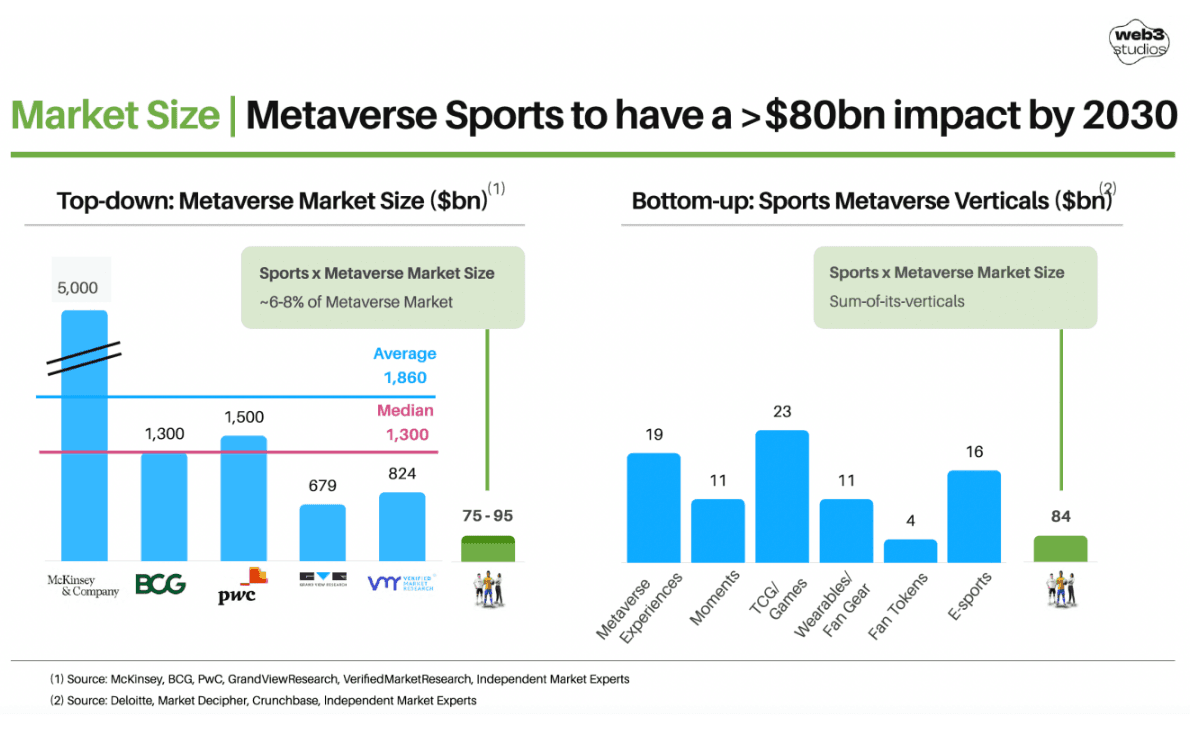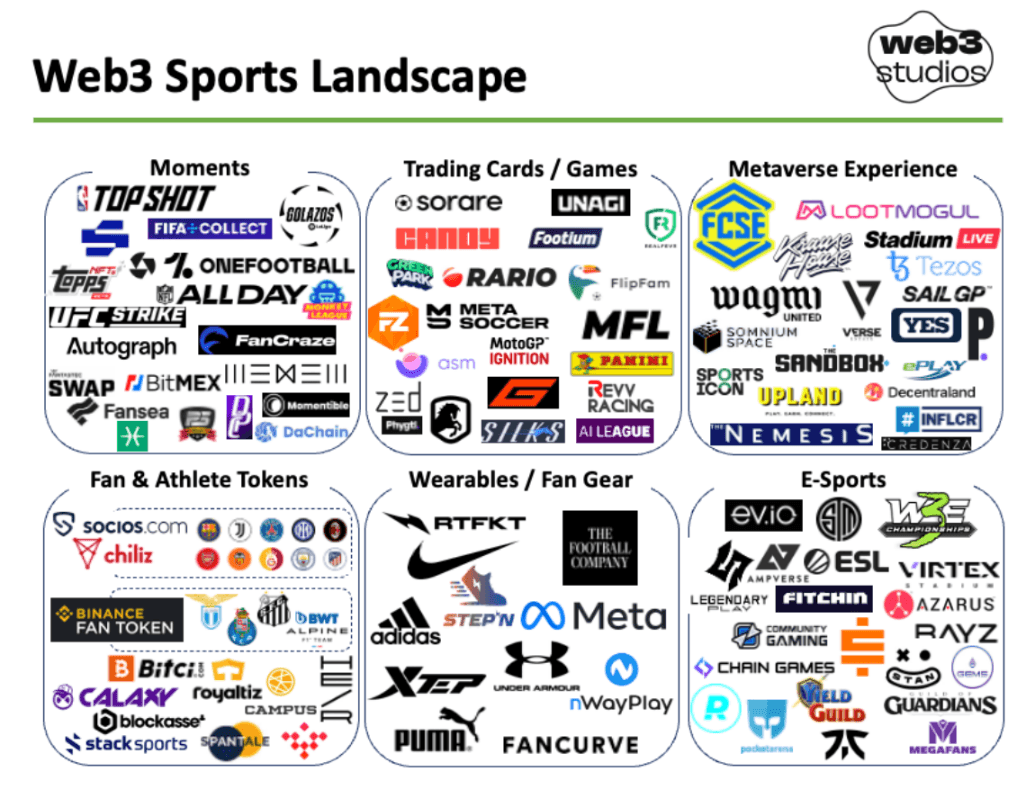Blockchain is leading a new round of technological changes in the world and offering new opportunities for the growth of the sports industry. Various corporations are expanding into Web3 to improve revenue streams and change the game of engaging with their fans.
February 22nd, 2023
Blockchain in the Sports Industry
Table of Contents
Sports industry is considered to be the fastest growing industry in the second decade of this new century. According to the Sports Global Market Report 2023 by The Business Research Company, the market value of the global sports industry grew at a compound annual growth rate of 5.2% from $486.61 billion in 2022 to $512.14 billion in 2023. The global sports market is expected to reach $623.63 billion in 2027 at a CAGR of 5.0%.
Over the next 10 years, the economic value of the Metaverse sports space is expected to grow exponentially to $80bn dollar opportunity by 2030. Consumer interest will grow rapidly in new ways to engage with their favorite sports and teams, as well as sports stars' positive attitudes toward new forms of monetizing their audiences. Many sports companies and investors are making significant investments in the industry because they see the promise that Metaverse technologies have for enhancing customer engagement, retention, and monetization in sports.

Market size of Metaverse and Sport Metaverse
The advent of blockchain has brought a new chance to the growth of the sports industry. The sports market can benefit from revolutionary upgrades to generate various forms of blockchain applications in sports including infrastructure, sponsorship, training, fan engagement, etc.
In the tech-driven era post-pandemic, the sports industry has understood the potential of blockchain. The rise of the digital-native fan and the events of 2020-2022 decimating ticket revenue for live events prompted both the sports and the esports industries to explore alternative revenue streams and find creative ways to maintain fan engagement while combating fraud and corruption.
Blockchain technology can effectively assist sports teams in monetizing their fan base and strengthening fan engagement effortlessly.
Thanks to blockchain technology, there are now many new potential for innovation in the sports industry, notably in the fields of data insights, smart contracts, tickets, and tokens. Blockchain technology is a tool that teams may use to collect and store data. Hence, tactics, overall team strategy, player health, and performance of both individuals and teams may all be enhanced.
The blockchain network may now be used to store decentralized applications for all facets of the sports business, including publishing and television rights, memberships, merchandising, endorsements, and so on. This includes contracts for athletes as well as contracts for all other parties involved.
Sports and blockchain have a growing relationship that is changing the way businesses and spectators engage in and interact with sports. There are a broad range of some best practices for blockchain emergence that your business needs to know to benefit your projects.
Black market has been a major problem in the sports industry. By adopting blockchain technology into ticketing, sports organizations can reduce the risk of fraud and ensure that fans have access to affordable tickets. It is also easy for everyone to verify the authenticity of tickets and trading them in a trustworthy marketplace with immediate, shared and completely transparent transaction information.
With real-time data and tamper-proof ledger for all transactions in live matches, blockchain can help increase trust in the betting process as it is publicly accessible. A secured betting platform is created to protect user data and prevent the risk of hacking.
Every bet will now be viewed as a smart contract with the ability to give out winnings in the digital wallets and remove intervention from any third parties effectively. Moreover, tokenization in blockchain can diversify a more flexible betting process, where users can easily place bets and receive payouts in a variety of cryptocurrencies.
Fan tokens benefit sports clubs and their fans in both ways. This is an opportunity for teams to approach new revenue streams as well as engage more with fans since the COVID pandemic. In contrast, blockchain enables the tokenization of sports assets such as tickets, merchandise, and even sports teams, so fans can purchase these tokens as an investment, to support their favorite teams or have a say in the decision-making processes.
Blockchain can be used to create more transparent and democratic governance structures in sports organizations. By using blockchain to record and verify decision-making, sports organizations can create a more trustworthy and fair decision-making process. Moreover, blockchain have the ability to provide a decentralized platform where decisions and transactions are publicly recorded and cannot be altered.
Blockchain will help out sports with enhanced transparency and accountability by the way sports organizations track and verify key information. It can help to manage the statistics of matches, performance data, ticket sales, sponsorship deals, etc. and ensure that everyone involved is held accountable for their actions.
Therefore, this is helpful to reduce the risk of dispute and detect ticket scalping. By using blockchain to create a more secure and transparent system, players cannot also alter or remove their history regarding achievements, injuries or doping cases. Now businesses and fans can get access to the necessary data in this advanced blockchain technology.
Blockchain technology is still in its infancy, and there is lots of space for experimentation and creativity in the sports business. By adopting blockchain, sports organizations may position the business at the forefront of a rapidly-evolving technology ecosystem, possibly unlocking new streams of revenue and development.
Popular football clubs such as Manchester City and Barcelona are already adopting blockchain technology in their digital strategies. Blockchain use-cases in sports allow teams to unlock new profitable income streams and enhance fan engagement. For that reason, many businesses are creating blockchain solutions to usher sport teams into Web3 spaces to leverage blockchain benefits and solve existing problems in the industry.
New categories have been able to arise as a result of technical advancements in AR/VR, tokenization, and unquestionably the excitement around NFTs during the past two years. But, in a broader sense, the drive for more interconnectedness and new audiences in sports is becoming a driver for fan participation.

Web3 Sports Landscape
Some outstanding use cases of blockchain below are definitely worth your attention!
Fantastec
Fantastec has created a blockchain solution in order to reward fan involvement with a platform that links fans with their favorite clubs and players. The Fantastec solution incentivizes their use of the app and enables them to actively participate in the growth of the club.
Fantoken
Fantoken has developed a token that allows supporters to vote on crucial club choices, such as choosing up-and-coming talent, or giving them the opportunity to provide input to the community. More tokens are earned and may be exchanged for merchandise or sports tickets the more actively the fans participate in the game.
SportyCo
SportyCo is a blockchain-based platform for crowdsourcing. The SPF token rewards investors with a portion of the athlete's future earnings and achievements in exchange for supporting talent. SportyCo connects athletes with fans directly.
Globatalent
Globatalent is a marketplace where individuals from all around the world may donate to and exchange their favorite teams, athletes, and sports heroes. Athletes can gather funds to further their careers and then give some of their profits to their supporters. Clubs and sports organizations can generate money in full transparency in return for a share of tickets, sponsorship, media rights, and other things.
Sport Decision
Sports Decision analyzes and digitizes data from sports club contracts, creating a clear link between player compensation and contracts and sporting outcomes. A first step toward safeguarding and streamlining data management between clubs, leagues, and players is the digitization of contracts and the interface with sporting outcomes.
REFERENCES
- Article: Blockchain and the Sports Industry
- Article: What are the Benefits of Blockchain in Sports and Esports?
- Report: Sports Global Market Report 2023 by The Business Research Company
- Article: The Future Of Blockchain In The Sports Industry
- Article: Impact of the COVID-19 Pandemic: Adoption of Blockchain in the Sports Industry
- Article: Blockchain gives sports clubs a lucrative way to increase their fandom
